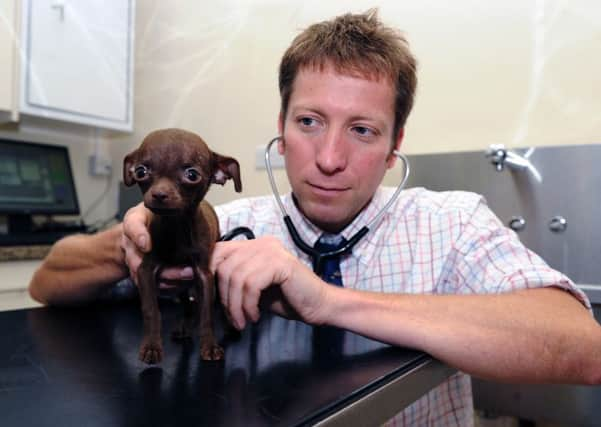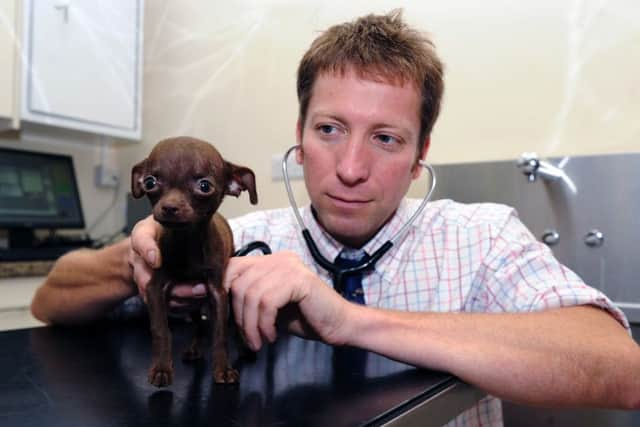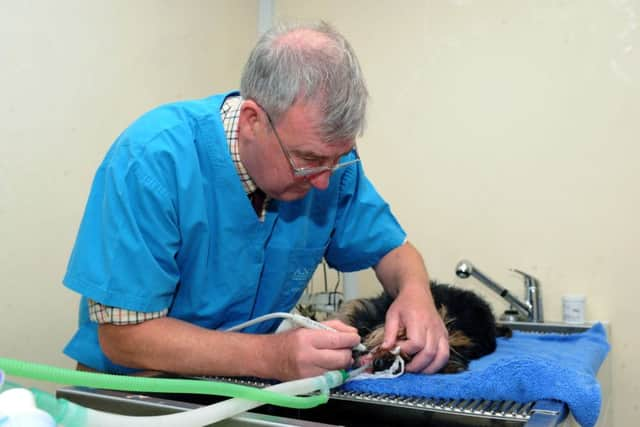The Yorkshire Vet: Behind the scenes at the James Herriot vet practice


JULIAN Norton has found himself something of a celebrity in Thirsk in recent weeks.
“No one’s asked me for my autograph yet, but the fishmonger in the market who I see every Monday he wanted his photograph taken with me this week,” he says, sounding a little bemused at his new found local status.
Advertisement
Hide AdAdvertisement
Hide AdJulian is ‘the Yorkshire Vet’ featured in the new Channel 5 series of the same name. More than 1.2 million viewers tuned in for the first episode earlier this month and audiences have clearly warmed to the six-part documentary, which is back on again tonight.


The series is based around the Skeldale Veterinary Centre in Thirsk, the original James Herriot (aka Alf Wight) practice, and captures the daily drama of events as they unfold. The Herriot link is never far away and the programmes are narrated by Christopher Timothy, who played Herriot in the popular BBC TV show All Creatures Great and Small.
Julian says they were approached by Leeds-based TV company Daisybeck Studios about doing the series in the Spring, but initially had their doubts. “We’re a busy practice and we thought it would be a distraction from our normal work.”
But after discussing it they had a change of heart. “We felt it would be good for the practice and it would be good for the area, because all those years ago when Alf Wight did all his books that was a real boost for Thirsk and the local community. We thought if we did something similar, although obviously not on the same scale, it could help bring a spark back to the town, which is how it’s turned out.”
Advertisement
Hide AdAdvertisement
Hide AdJulian is one of three partners, along with Peter Wright and Tim Yates, who carry out all aspects of veterinary work at the centre alongside their team of vets.


“Most practices that are still mixed will have separate departments that do small animal work and general work, but we still strongly believe that the mixed nature of the job makes the work more interesting and varied, and I think if you’re a decent vet you can just as happily treat a calving cow as you can a cat with an insect sting.”
They combine this traditional ethos with modern veterinary practices and take pride in the fact that part of the fabric of life in the market town.
It’s mid-morning and the waiting room is bustling with owners and their pets. A Yorkshire terrier and an incredibly fluffy Samoyed are in for minor operations, while a baby chihuahua, which had been poorly, has rallied and appears to be enjoying being the centre of attention among the dotting staff.
Advertisement
Hide AdAdvertisement
Hide AdAs well as these routine operations a pet has been brought in for a series of tests (the equivalent of a dog passport) so that it can travel with its owner to South Africa.
The majority of work is what they call small animals, usually cats and dogs, but most days they will do outside calls. “We still have some traditional farms that work out of the same sort of mould as back in Herriot’s day and we have modern farms, too. So you might be lambing a sheep or health testing some alpacas.”
He believes that people expect more from vets than they used to. “I think in recent years the public perception of veterinary practices has changed. They see things like The Supervet on telly and think that’s more standard than it actually is.”
But at the same time, as Julian is quick to point out, there’s no such thing as an average day. “It sounds a bit of a cliché but every day really is different and I think the television series has captured that well.”
Advertisement
Hide AdAdvertisement
Hide AdFellow partner Peter Wright, who joined the practice in 1982, was reticent about getting involved in the TV series to begin with. “I thought this sort of thing had already been done umpteen times. So I didn’t think there would be much interest.”
Which is why the show’s popularity has taken him by surprise. “I’m staggered by the level of interest and not just locally. We have friends that have rung us up from America who have seen it on YouTube.
“I said one night to my wife when we were watching an episode ‘why do people want to watch all this?’ and she said, ‘they’re not interested in you, they’re interested in the animals.’ And she’s right, that’s exactly it.”
Most of the animals they see at the centre tend to be pets, but over the years Peter has come face to face with some more unusual and exotic creatures. “The circus has been in town a few times and the year before last they rang up and said they needed a routine inspection, which they had to have done every three months.
Advertisement
Hide AdAdvertisement
Hide Ad“I asked what I had to look at and they said they had a bull, which wasn’t a problem, I’ve seen plenty of them over the years, they had a resident fox and half a dozen pythons. I wasn’t sure about the pythons but I thought I’d give it a go, and in the end I really enjoyed it.”
So when the call came in again from the same circus three months later, Peter was happy to lend a hand. “I thought it was dead easy, but then they said to me they were having a problem with one of the tigers that was a bit lame and would I mind having a look at it? I wanted the ground to swallow me up at that point, I thought ‘what have I let myself in for here?’”
In the end he examined the tiger, from the other side of the bars. “The adrenaline was certainly flowing because you don’t get many tigers in Thirsk, or pythons for that matter.”
Peter says veterinary practices change over the years, but remains philosophical about it. “Like everything in life it is constantly evolving. You see more practices bought by corporate bodies who have business models and shareholders to answer to. It’s a far cry from the days of Herriot but that’s the way of the world and it still gives me a buzz to come into work on a morning.”
Advertisement
Hide AdAdvertisement
Hide AdJulian agrees and says life as a vet requires an increasing amount of hard graft. “I’ve got two kids and one of them is very keen to be a vet and I wouldn’t discourage him from doing that because it’s still a brilliant profession. But it’s a very challenging profession now, you look at students coming out with very high debts and long university courses and to start with there’s not a lot of financial reward.”
A 10 hour day is par for the course for him and on top of that he is usually on call twice a week, which might mean going out in the middle of the night. “Sometimes you might not get any calls, but typically you get two or three,” he says.
“But you’ll be calving a cow at midnight and you might be hungry because you’ve not had your tea and you haven’t seen your kids, but when the calf is there looking up at you, you suddenly forget all the long hours - those moments make the job special.”
To see more from Julian and to get a glimpse behind the scenes at the centre, go to yorkshirepost.co.uk/features
The Yorkshire Vet is on Channel 5 on Tuesdays at 8pm.
Working with the ‘real’ Mr Herriot
Advertisement
Hide AdAdvertisement
Hide AdPeter Wright was born and raised in Thirsk and has worked at the Skeldale practice since 1982. He remembers those early days well.
“There would be a massive turnout during afternoon surgery. The waiting room would be full and they’d be queuing down the street. There’d be six animals to see and the rest of the people were clutching books for autographs.
“He shunned the limelight as much as he possibly could, but he thought when people had made the effort to come and see him the least he could do was meet them and sign their books.
“But he wasn’t bothered about money or fame, he was just interested in doing his job, having a quiet pint after work and going home to watch the football on TV.”